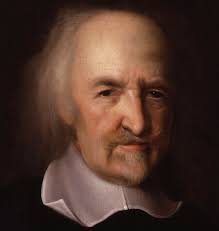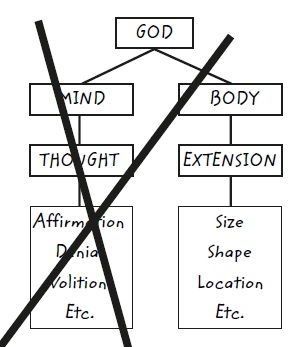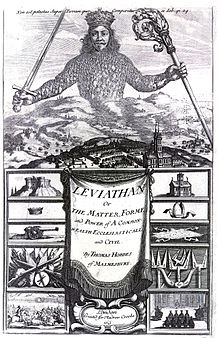 Welcome to our topic on Thomas Hobbes! After the revolutionary work of Descartes in the field of mathematics and philosophy, another philosophical giant stepped forward in the person of Thomas Hobbes. Thomas Hobbes (1588–1679) is one of the greatest of political philosophers, and his most famous work, Leviathan (1651), remains a controversial classic to this day. His vision of the world was strikingly original at the time, and is still relevant to contemporary politics. He did not shrink from addressing sensitive issues head on, and while few have liked his thesis, many have seen the political realism it represents. So, join me as we read and ponder on the “Materialism of Thomas Hobbes.”
Welcome to our topic on Thomas Hobbes! After the revolutionary work of Descartes in the field of mathematics and philosophy, another philosophical giant stepped forward in the person of Thomas Hobbes. Thomas Hobbes (1588–1679) is one of the greatest of political philosophers, and his most famous work, Leviathan (1651), remains a controversial classic to this day. His vision of the world was strikingly original at the time, and is still relevant to contemporary politics. He did not shrink from addressing sensitive issues head on, and while few have liked his thesis, many have seen the political realism it represents. So, join me as we read and ponder on the “Materialism of Thomas Hobbes.”
“Man is a machine.” ~ Thomas Hobbes
Intended learning outcomes (ILOs)
At the end of this topic, you should be able to:
- Explain the influence of Materialism of Hobbes in the modern epistemology
Who is Thomas Hobbes?
Thomas Hobbes (1588-1679) was born prematurely because his mother panicked when she heard that the Spanish Armada was approaching. “Fear and I were born twins,” he used to say, referring to his own anxious personality. He formed connections at the highest level that were both personal and intellectual: he used to visit Francis Bacon during Bacon’s years of retirement; in France he moved in the same circle as Descartes, with whom he corresponded about philosophy, and the mathematician Gassendi, who became a good friend; and in Italy he visited Galileo. For two years he was mathematics tutor to the future King Charles II.
In 1640, Hobbes fled to France to escape the English Civil War, staying there for 11 years. His first book, De Cive, was published in Paris in 1642. But it was his ideas on morality, politics, and the functions of society and the state, set out in Leviathan, that made him famous.
Works of Thomas Hobbes

In an age dominated by religion, and by religious action, when to deny belief in God brought a man foul of the law and might endanger his life, Hobbes boldly came out with a philosophy of complete materialism. Hobbes solved Descartes’s dualistic dilemma simply by dismantling dualism. He loudly proclaimed a form of mechanistic materialism reminiscent of Democritus’s atomism, thereby rejecting one side of Descartes’ diagram; and Hobbes’s thinly disguised atheism rejected Descartes’ “infinite substance” as well. For Hobbes:
“The only things that existed in reality were bodies in motion.”
Despite his claim that “there exist everywhere only bodies,” Hobbes did not actually deny the existence of thoughts. He simply held them to be “phantasms,” or shadows of brain activity, mere epiphenomena that had no practical effect on the physical system.
Hobbes’s strategy was to show that there is a basic mental activity, perception, or, as he called it, “sense,” from which all other mental phenomena are derived and that perception itself reduces to matter in motion. Perception, he maintained, occurs as follows: Motion in the external world causes motion within us. This motion within (which Hobbes called a “phantasm”) is experienced by us as an external object (or group of objects) having certain properties. The properties do not really exist in the objects, Hobbes said; they are just the way the objects seem to us.
So motion outside us causes motion within us, which is a perception. If the internal motion remains for a while even after the external object is no longer present, it is then imagination or memory. And thinking, he said, is merely a sequence of these perceptions.
Now, humans, unlike animals (Hobbes said), are able to form signs or names (words) to designate perceptions, and it is this ability that allows humans to reason. In Hobbes’s view, reasoning is nothing but “adding and subtracting of the consequences of general names.” Reasoning occurs, for example, when you see that the consequences of the name circle are, among other things, that if a straight line is drawn through the center of a circle, the circle has been divided into two equal parts.
As for decisions and other voluntary actions, such as walking or speaking or moving our arms, these are all movements of the body that begin internally as “endeavors,” caused by perceptions. When the endeavor is toward something that causes it, this is desire; when away from it, it is aversion. Love is merely desire, and hate merely aversion. We call a thing “good” when it is an object of desire and “bad” when it is an object of aversion. Deliberation is simply an alternation of desires and aversions, and will is nothing but the last desire or aversion remaining in a deliberation.
The Psychological Egoism Theory of Thomas Hobbes
Hobbes’s psychology is very pessimistic. Every living organism obeys laws of individual survival; therefore, all human acts are motivated by self-interest and the quest for power. Altruism is not just a bad idea; it is impossible. Far from being immoral, egoism is the only show in town. He claimed:
“Of the voluntary acts of every man, the object is some good to himself.”
What makes Hobbes’s psychological egoism pessimistic, in my opinion, is that if it is true, then it is impossible for individuals to act except in ways that they take to be in their own interest. Anyone who makes a claim to the contrary is lying or is in a state of self-delusion, ignorance, or stupidity.
The Social Contract Theory of Thomas Hobbes

Thomas Hobbes is best known for his political philosophy, which is influenced by his egoistic theory of motivation. In his masterpiece, he recognized the state as an artificial monster (the “Leviathan”) that restricts what little freedom there is in nature and flaunts its power over the individual. Hobbes justified the existence of the political state by contrasting it to the notorious “state of nature.”
In that default state, each person would have a right, or license, to everything in the world. This, Hobbes argues, would lead to a “war of all against all” (bellum omnium contra omnes) which holds:
“In such condition, there is no place for industry; because the fruit thereof is uncertain: and consequently no culture of the earth; no navigation, nor use of the commodities that may be imported by sea; no commodious building; no instruments of moving, and removing, such things as require much force; no knowledge of the face of the earth; no account of time; no arts; no letters; no society; and which is worst of all, continual fear, and danger of violent death; and the life of man, solitary, poor, nasty, brutish, and short.”
So, in order to avoid it, people accede to a social contract and establish a civil society. According to Hobbes, society is a population beneath a sovereign authority, to whom all individuals in that society cede some rights for the sake of protection. Any power exercised by this authority cannot be resisted, because the protector’s sovereign power derives from individuals’ surrendering their own sovereign power for protection. The individuals are thereby the authors of all decisions made by the sovereign. However, in case the sovereign authority abuses its powers, Hobbes said:
“he that complaineth of injury from his sovereign complaineth that whereof he himself is the author, and therefore ought not to accuse any man but himself, no nor himself of injury because to do injury to one’s self is impossible.”
Works Cited
- Stumpf, S. (2008). Socrates to Sartre: A History of Philosophy. New York: McGraw Hill Higher Education.
- Gaarder, Jostein.(2004). Sophie’s World. Great Britain: Phoenix House.
- Ramos, Christine Camela. (2004). Introduction to Philosophy. Manila: Rex Bookstore.
- Palmer, Donald. (2006). Looking at Philosophy: The unbearable heaviness of philosophy made ligther, 4th Edition. New York: McGraw Hill Higher Education.
- Dorling Kindersley. (2011). The Philosophy Book. New York: DK Publishing.
- http://www.plato.standford.edu
- http://www.philosophybasic.com